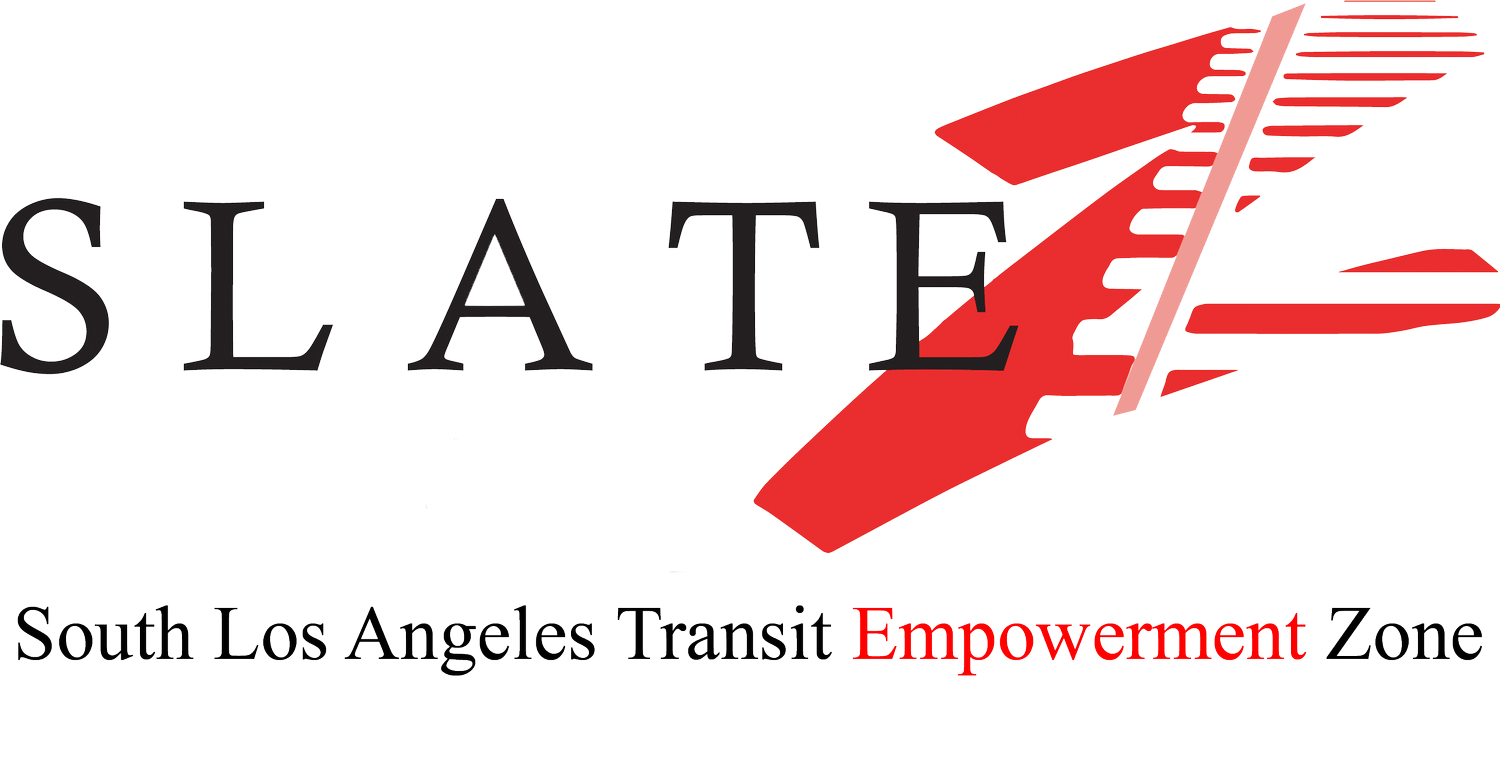Introduction
After the 2016 designation of the South LA Promise Zone, the South Los Angeles Transit Empowerment Zone (SLATE-Z), i.e., the backbone entity and convenor for the South LA Promise Zone and related work, launched several workgroups that help revitalize South LA by moving residents to economic opportunity. These workgroups and related subcommittees are organized around five levers of change: jobs, education, small business and entrepreneurship, transit, and public safety. The promise zone area had a poverty rate of around 40% in 2016. As such, the Jobs goals, for example, needed to be ambitious. To address economic opportunity in South Los Angeles, we seek to move 10,000 residents living wage jobs over a 10-year period.
We have made some significant progress in our goals. Specifically, the poverty rate in the South LA Promise Zone area has dropped to roughly 30%. Further, SLATE-Z and its partners have helped move nearly 9,500 people into living wage jobs: https://slatezdata.org/jobs/. Even though we are proud of this progress, there is more work to be done. Following the COVID-19 pandemic, economic recovery has been uneven across the region and in South Los Angeles job growth has been relatively flat and is still down from where it was pre-pandemic. While SLATE-Z and its partners continue to explore this work in regular jobs workgroup meetings, we saw a need to deepen and expand the work through additional efforts. While we are doing this by exploring and implementing new grant opportunities, facilitating specific partnership efforts, and expanding research and evaluation efforts, we are also taking on two new specific projects: (1) convening a group of leaders, including those from the nonprofit sector, the public sector, unions, and academic institutions to engage and spark actions to spur job growth in South Los Angeles; and (3) launching Jobs+ merge meetings that link discussion around jobs with other areas such as education or transit. As a result of this work, we are exploring ways to facilitate more successful apprentice programs, workforce placements, and work-based learning opportunities.
Job Growth Convenings
Overview
SLATE-Z Jobs Workgroup’s goal is to move South Los Angeles into 10,000 living wage jobs by 2026. Since the pandemic and lockdown, economic recovery has been uneven across the region and South Los Angeles’ job growth is flat. Building on the work that is occurring in quarterly SLATE-Z jobs workgroup meetings, we began convening a group of leaders, at Los Angeles Trade Technical College (LATTC) to engage and spark actions to spur job growth in South Los Angeles. At our first convening on March 6, 2024, partners and participants worked in small groups to determine strategies to attract jobs to South Los Angeles and train the workforce to fill positions. The program highlighted data updates from Neighborhood Data for Social Change (NDSC) followed by expert panelists Dr. Marcia Wilson (Los Angeles Trade Technical College), Mike Kelley (Los Angeles Cleantech Incubator [LACI]), and Sydia Lopez-Reese (Los Angeles Department of Transportation), each of whom focused on insights, resources, and pathways to job growth.
For the first convening, we focused on green jobs, public sector positions, and the tech sector, as well as the systems and infrastructure needed to create and support a climate-resilient economy. SLATE-Z and partners committed to seeking collaborations, connections, and intersectionality across silos to increase living wage jobs in South LA. The two main takeaways from the first convening were: (1) the importance of working together to make connections and guide workers to pipelines and (2) the need to engage decision-makers to be part of the solution for sustained growth. Additional conversations have followed from this convening, to explore more granular issues on how to improve workforce placements.
The second convening in the Job Growth Convening Series, focused on Small Business and Entrepreneurship, was held on Tuesday, October 15, 2024. This convening highlighted ways we can support local small businesses further succeed, thrive, and meet the needs of customers and grow jobs in the region. As we prepare for the World Cup, Super Bowl, Olympics, and other major cultural events coming to South Los Angeles, SLATE-Z and partners prioritize promoting local vendors and identifying resources to build small business capacity. The goal of this session was to connect South LA Small Business owners/Entrepreneurs to staffing, resources, trainings, and capacity-strengthening opportunities.
Kianna Scott of Charger Help! and Jessica Ku Kim, Chief Deputy of Los Angeles County Department of Economic Opportunity (DEO) presented on the assets and resources available to Small Businesses and Entrepreneurs.
““We must thread small businesses into the strategy,” said Kim. “Economic redevelopment only happens with partnerships. A win for an agency or small business is a win for the County.” ”
A third convening focused on opportunities for youth, foster youth, and opportunity youth in South Los Angeles took place on February 19, 2025. The goal of this convening is to connect the dots and provide road maps to apprenticeships, increase workforce and program readiness, and support incubators for scaling up. As an example, construction pre-apprenticeship training connects individuals to unions, support visits to union shops to see what it is like to work there, assess for successful matches, and provide support for suitability and aptitude in the field. Jose Guadron, CRCD’s Senior Director of Workforce Development and NextUp from Los Angeles Trade Technical College presented on their programs and shared eligibility and resources for youth under 26 years old to participate.
Partners
SLATE-Z's Partners in the Job Growth Convening series are varied, and include: Asian American Drug Abuse Program (AADAP); Brotherhood Crusade; City of Los Angeles Economic & Workforce Development Department (EWDD); Coalition for Responsible Community Development (CRCD); US Department of Housing & Urban Development (HUD); Housing Authority of the City of Los Angeles (HACLA); Los Angeles Cleantech Incubator (LACI); Los Angeles Trade Technical College (LATTC); Los Angeles Department of Transportation (LADOT); Metro LA; MOVE-LA; PV Jobs; International Brotherhood of Electrical Workers; Vernon-Slauson Economic Development Corporation; USC’s Neighborhood Data for Social Change (NDSC); Watts LA WorkSource Center; and YWCA.

